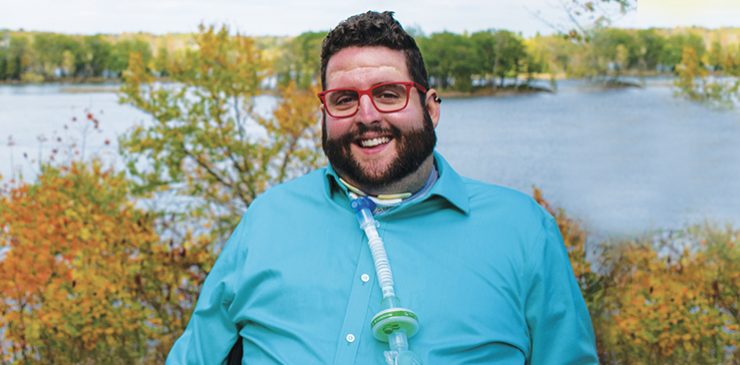Drew sustained a spinal cord injury in 2011 at the age of 20 when he was on a humanitarian trip in Peru and a large wave pulled him underwater, leaving him paralyzed from the shoulders down. Halfway through university at the time, he quickly became privy to the many obstacles that those with physical disabilities face on a daily basis.
Drew’s journey began with a 51-month hospital stay, waiting to be able to move home with round-the-clock care in place. While most of his time was spent at Kingston General Hospital, he was eventually moved to St. Mary’s of the Lake Rehab Hospital, where the focus shifted to transitioning back into the community. There, he re-enrolled in university and successfully completed his degree in Commerce and in Hotel and Food Administration through distance education.
“I would Skype into my lectures and took courses straight from my hospital room,” says Drew.
Still, he was determined to return to life in the community, despite being told that he would likely have to live in an institution as a result of his ventilator. “I told myself I would no longer live in a hospital – I’ve already done it for four years,” he shares.
“I’ve always been big on creating change and making a difference in the world – even prior to my accident, I was involved in projects for the homeless. Once I had an SCI, I learned that people with disabilities are not treated fairly. There was a big difference pre and post-injury and it was an eye-opener.”
The transition came with challenges – from navigating 24/7 PSW care to his parents having a new house built to meet his new accessibility needs, Drew attributes his success to the support of his family and has since been able to live independently with the help of programs like Direct Funding through the Centre for Independent Living. However, complications from his injury continued to present challenges.
“Because I drowned in the ocean,” says Drew, “My lungs have been a major issue since my injury. I have been in life or death situations and am lucky to be alive.” In reflecting on the long road to freedom and living in the community, he shares that it is an enormous relief to live independently.
Eager to get involved in advocacy projects, Drew got in contact with SCIO, where he became a peer mentor. Through seeing the work that SCIO does in advocacy, Drew realized the power that comes from being able to enact change at legislative levels, to better serve and allow people with disabilities to grow and thrive independently.
“I’ve always been big on creating change and making a difference in the world – even prior to my accident, I was involved in projects for the homeless. Once I had an SCI, I learned that people with disabilities are not treated fairly. There was a big difference pre and post injury, and it was an eye opener. It was a complete 180 in terms of what life was like and what it would look like after that,” he says.
In addition to mentoring others with spinal cord injuries, Drew also had to step up to the plate and advocate on his own behalf. He fought for coverage at the government level for a diaphragmatic pacemaker to be implanted into his body. “At 35 thousand dollars, this is not covered. I worked hard at advocating to get it funded, but many others in the community do not have the time and resources to do so. There is no handbook on living with a disability. Everything has been a challenge since my SCI. I’m trying to create the change needed, because people with disabilities can make a valuable contribution to society. We are not a burden that uses up public resources.”
With a variety of work experience from sales and marketing to consulting, to working with the Rick Hansen Foundation to improve accessibility, Drew is ready to take his passion for advocacy to the next level by representing the NDP in Lanark-Frontenac-Kingston.
“After eight years of living with a disability, I started to realize that there is no one within the government representing the disability community and that no one is advocating for our needs,” he shares. “It was time to step up and get involved to speak up on behalf of our community on the broken healthcare system in place and other issues. There is no one in the government who has been on the receiving end of care and I have experienced it all – from complex care to rehab. I want to try a bottom up approach. I’m not running for politics for the money and glamor, I’m doing it to create change. To speak up for those who do not have a voice and are struggling to make ends meet with programs like ODSP. “
Whether he gets elected or not, Drew’s hope for the future is that people with disabilities are respected and treated as equals in society, able to thrive and contribute meaningfully.






